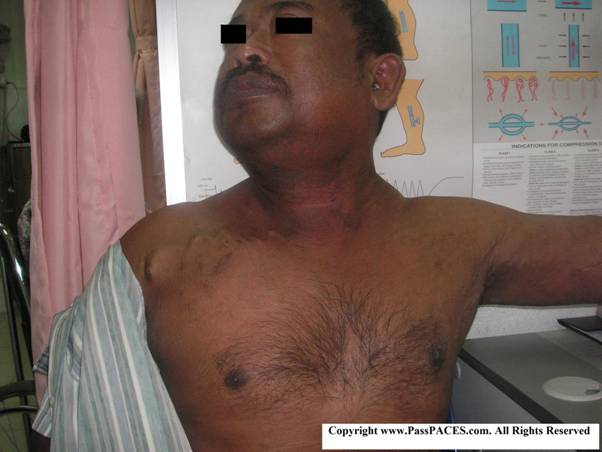
|
|
|||||
|
|
|
|
|
|
|
![]()
YOUR MRCP PACES IS HERE!
Pass MRCP PACES in ONE Attempt! - PassPACES First Ebook!!
Station Neurology:
Examine this gentleman gait and proceed
Discussion:
Easy case in MRCP PACES? Not quite if you do not how to examine this patient properly.So how do you describe his gait? There are various types of gait which are popular in PACES. Today, you are seeing what can be considered as ataxic gait. You notice that there is lack of coordination of muscle movement. This poor gentleman has unstable and broad base gait . You can try to ask patient to do tandem walking, however, make sure patient will not fall down and support him if necessary, if patient is unable to do it, NEVER force them! First principle to remember in MRCP PACES- DO NO HARM!
OK, after observing the ataxic gait, it is rather easy because there are only a few possible causes in MRCP PACES, the causes are
![]() 1)Cerebellar lesion ( various causes include stroke, multiple sclerosis, tumour, Wilson disease etc)
1)Cerebellar lesion ( various causes include stroke, multiple sclerosis, tumour, Wilson disease etc)
![]() 2)Hereditary ataxia- popular cause will be Friedrich's ataxia ( therefore always pay attention to look for Pes cavus)
2)Hereditary ataxia- popular cause will be Friedrich's ataxia ( therefore always pay attention to look for Pes cavus)
![]() 3)Others- drugs such as ethanol, antiepileptic especially pheytoin and recreational drugs. Can be due to para-neoplastic cerebellar degeneration too.
3)Others- drugs such as ethanol, antiepileptic especially pheytoin and recreational drugs. Can be due to para-neoplastic cerebellar degeneration too.
I think Cerebellar stroke is a popular cause of ataxic gait if you are sitting the exam in Asia but always think of Friedrich's ataxia and multiple sclerosis if you plan to sit the examination in UK.
It is easy to remember cerebellar signs- Just remember HANDS Tremors ( Hypotonia, Asynergy-lack of coordination with disdianochokinesia ,Nystagmus,Dysarthria, Stance&gait and Tremors ie intentional trmor)
Therefore to differentiate all the above causes, after observing the gait, I will proceed to examine the lower limbs neurologically to find out the underlying cause.
Depending what the final diagnosis is, if I think it is a cerebellar stroke, I would tell the examiners that I would like to measure this gentlman's blood pressure and check for glycouria. If no cause can be found and the patient is young, then family history and drug history will be utmost important!
Extra points:
| ID:2 | Created: 20 Dec 2009 |
Interesting Images in Clinical Medicine.

Case History:
Mr Z is a 65-year old Malay gentleman who has been on haemodialysis for the past 5 years via a fistula over his right arm. He comes in with a complaint of neck swelling. What is the abnormality you see and what is the probable diagnosis??
To see previous issues, click here! To send a quick comment, click here!
